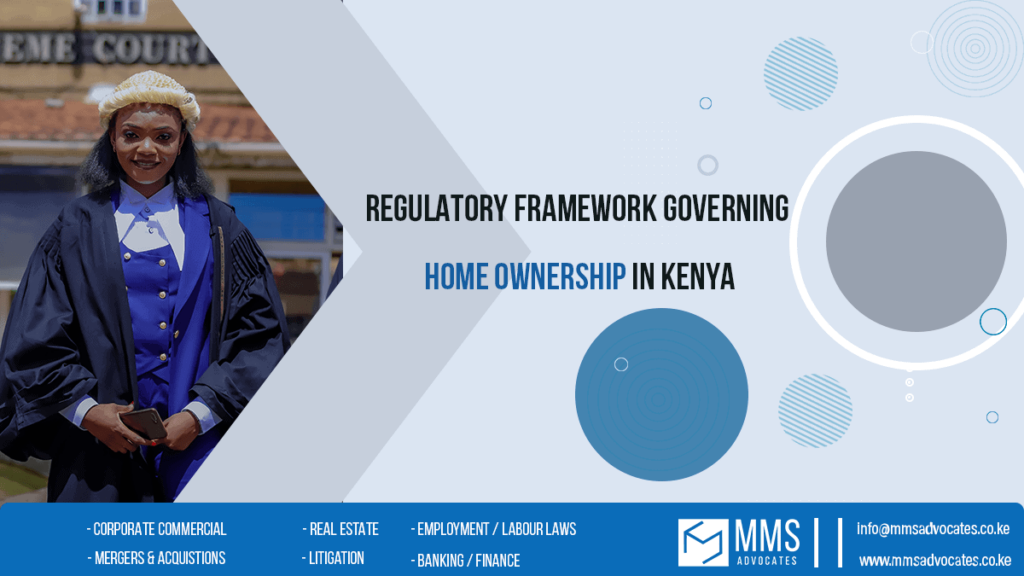
Introduction
The Constitution of Kenya, 2010 provides for the right to accessible and adequate housing under Article 43(1) (b), which is fundamental to enable individuals live in dignity. The Constitution envisages every person having a right to accessible and adequate housing as well as reasonable standards of sanitation. However, access to the right to a house for a majority of Kenyans is elusive owing to the high cost of housing finance.
Legal Framework Governing Home Ownership in Kenya
- The Constitution of Kenya,2010
The Constitution being the supreme law of the Country provides for legal framework in land transaction and in turn home ownership. Chapter Five of the Constitution provides for Land and Environment, which cuts across home ownership.
Key statutes:
- Land Act, 2012 (LA)
The Act together with the series of land regulations which consolidate all the different land systems in Kenya provides for sustainable administration and management of land and land based resources.
- Land Registration Act, 2012 (LRA)
This governs the registration of contracts and instruments in relation to land.
- Community Land Act, 2016 (CLA)
Provides for the recognition, protection and registration of community land rights; management and administration of community land.
- National Land Commission Act, 2012(NLC)
Provides for functions and powers of the National Land Commission (NLC);
- Sectional Properties Act, No. 21 of 2020
This provides for the division of buildings into units, ownership of common property of buildings and for the use and management of units and common property.
- Physical and Land Use Planning Act (Act No. 13 of 2019) (PLUPA)
This repealed the Physical Planning Act, Cap 286 and provides the framework on matters relating to land use development planning, development control, enforcement and dispute resolution.
- Environmental Management and Coordination Act, 1999 (EMCA)
Deals with environmental issues and establishes the National Environment Management Authority (NEMA).
- Environment and Land Court Act,2011 (ELC Act)
Establishes the Environment and Land Court (ELC) and sets out its powers and functions.
- Land Control Act (LCA)
Regulates transactions affecting agricultural land and establishes the Land Control Boards.
- Urban Areas and Cities Act 2011
Provides for the classification, governance and management of urban areas and cities.
- Housing Act (Cap 117)
Together with the accompanying Housing Fund Regulations, 2018 enacted in December 2018 to provide the legal framework for the implementation of the Affordable Housing Scheme.
- Stamp Duty Act (Cap 480)
Provides for the levying and managing of stamp duties.
- Income Tax Act (Cap 470)
Provides the legal framework for levying and computation of capital gains tax on transfer of property.
- The Value Added Tax, 2013
Provides the legal framework for levying of value added tax on the sale, leasing, renting of commercial properties.
Government agencies governing Home ownership:
- Ministry of Lands and Physical Planning
The Ministry is in charge of providing direction and co-ordination on all matters relating to land, housing and urban development including land administration, physical and urban planning for land use, survey and mapping, land adjudication, settlement matters, rural settlement planning, land registration, national spatial data infrastructure, land and property valuation services.
- National Land Commission (NLC)
The NLC was established under the NLC Act to regulate the use of public land and formulate national land policy.
- Land Registries
Established under the LRA for maintaining land registers and undertaking registration of documents and instruments relating to transactions in land in each registration unit.
- Land Control Board (LCB)
Established under the LCA to have oversight of and control transactions affecting agricultural land.
- Department of Survey
The department is responsible for national surveying and mapping of land in Kenya
- National Environment Management Authority (NEMA)
NEMA’s function is to implement all policies relating to the environment.
- County Governments
Counties are established under the Constitution and the County Governments Act 2011. County Governments consider the initial applications for development permissions within their jurisdiction i.e. extension of user, change of user, subdivision, amalgamation and building and construction permits.
They also hold unregistered community land in trust for the local communities within their jurisdiction.
- Environment and Land Court (ELC)
A superior court established under the ELC Act to hear and determine disputes relating to the environment and the use, occupation of and title to land.
- The Kenya Revenue Authority (KRA)
The KRA is an agency that is responsible for the assessment, collection and accounting for all revenues including land rent, residential income tax, value added tax, stamp duties and capital gains tax.
Conclusion
The above stated laws, regulations and agencies are the key areas that any individual who intends to purchase a land and or home needs to familiarize themselves with for easy and smooth transaction in the entire procedure.